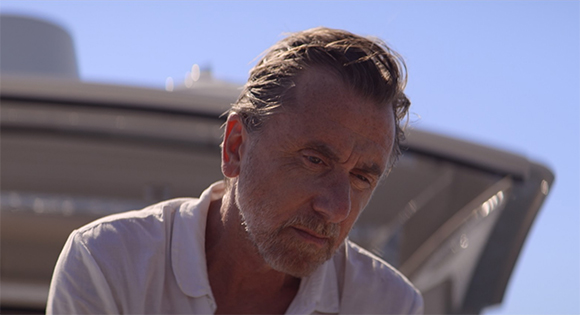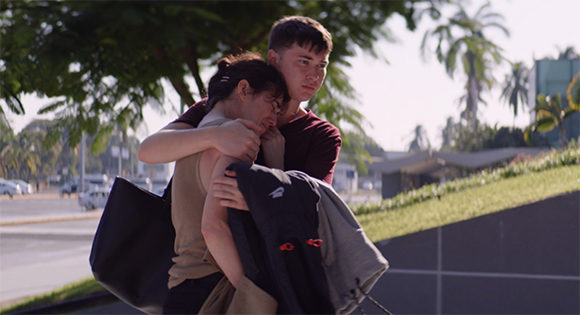Especially in a time of continuing pandemic, when many in the world with the privilege to do so are questioning their life choices and pursuing what really matters to them, Michael Franco’s Sundown offers a continuously compelling glimpse into one man’s odd approach. It’s a mystery without any carefully orchestrated a-ha moments, a sun-drenched enigma that is as languid, poker-faced, and still unwaveringly certain of its choices as its main character.
Neil (Tim Roth) is first found floating lazily in a pool at a high-end Acalpulco resort. His family, including Alice (Charlotte Gainsbourg), Alexa (Albertine Kotting McMillan), and Colin (Samuel Bottomley), share the picturesque space with him. But something seems off from the start. Soon, this pristine picture is interrupted by a phone call offering bad news and the family rushes to the airport to get home to England. Just as boarding begins, Neil reveals that he has left his passport at the resort. He urges his family to board the plane without him, assuring them that he will take the next flight.

But Neil doesn’t take the next flight and it’s here, once he is alone and free of familial obligations, that he and the film begin to shake off expected conventions and find themselves. Neil trades his posh accommodations for a rundown motel and soon meets a local, Bernice (Iazua Larios), with whom he begins an affair. Franco’s script conceals and slowly reveals information, allowing viewers to question and even condemn Neil’s actions, while also uncovering details that unmoor the audience just enough to keep them interested. Before long, a twist upturns everything that has come before and Neil’s intentions become both far clearer and far more devastating.
There are many things happening beneath the relatively serene surface of Sundown and as the film progresses, the reveals of these multiple layers are often accompanied by a bout of shocking violence or a shot of disorienting dream logic. Neil, appearing at first blush as exceedingly selfish, takes on far more complicated shades and textures. Franco is fully aware of his main character’s privilege, especially when juxtaposed with his surroundings, but he also wants to drive home the point that depressive angst can descend on all, no matter the seeming comforts of class and social status. As Neil escapes his life by drinking, lounging, and romancing a woman, we fear he might leave at any moment, Franco is sure to show the desperate realities and wealth disparities that surround him. Sundown might be too mysterious to actually be saying satisfyingly meaty things about class and entitlement, but it still succeeds at showing how suffering comes in many shapes and sizes, and has the power to push the human psyche to extreme and alienating measures.

The human race is increasingly more aware that our time is short and that each of our daily choices essentially define our brief lives. Though few viewers will fully relate to many of the specific details of Neil’s life, Sundown nudges its audience to search within themselves to answer timeless and universal questions: Who am I? What do I really want? How will I spend the little time I have on this planet? As with Neil, the paths that lie before all of us are often murky and mysterious, but taking accountability for shaping each step with humble and honest intention might just bring the roadmap into sharper
focus.
